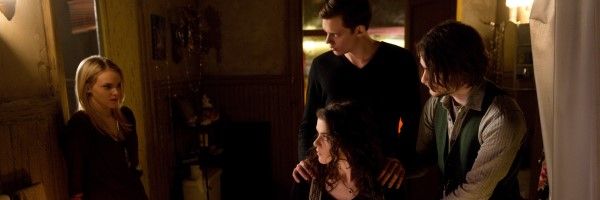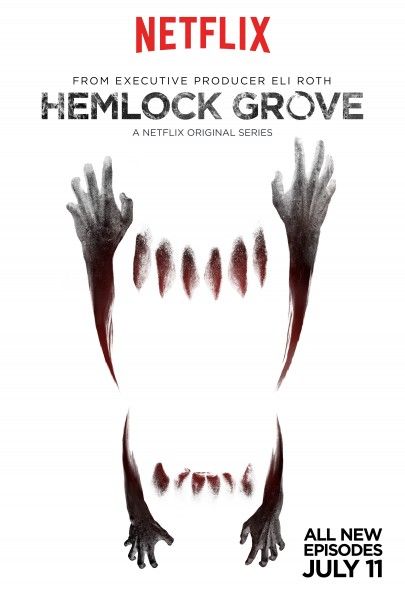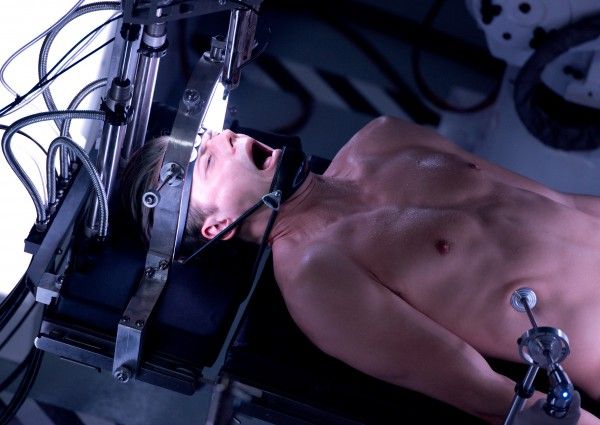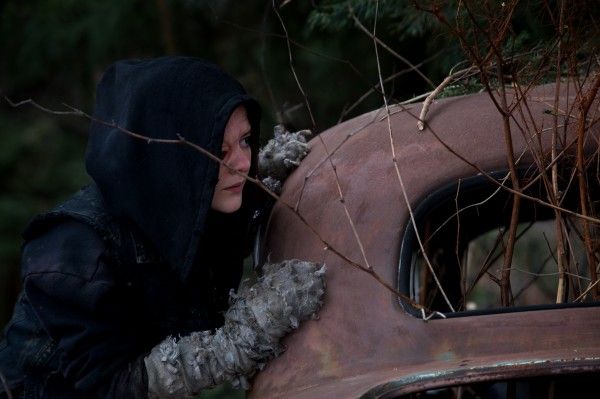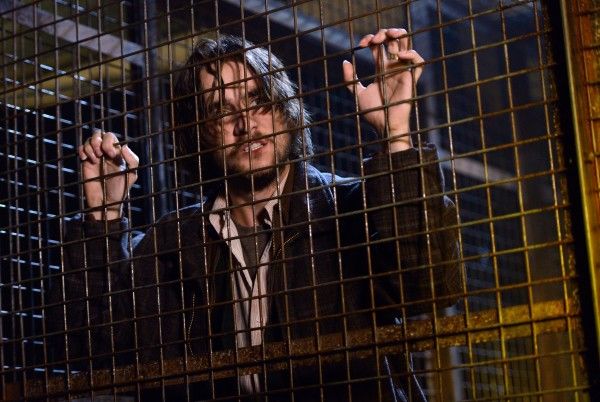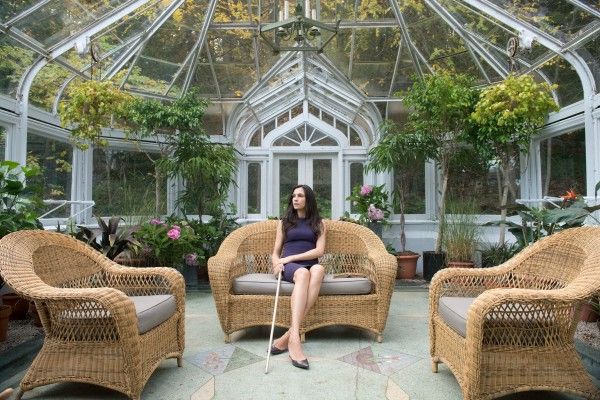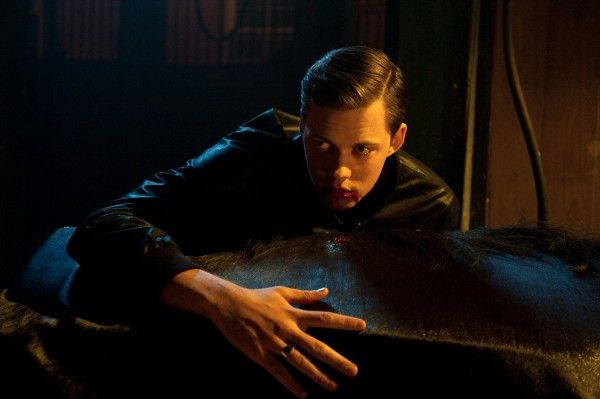From executive producer Eli Roth the Netflix original series Hemlock Grove returns July 11th for a second season that promises more blood, guts and betrayal. The supernatural thriller centers on the mysterious happenings of a small Pennsylvania town where vampires, werewolves, and genetically engineered Frankenstein monsters roam the streets side by side. Season two looks to get darker, sexier and scarier as Peter (Landon Liboiron) and Roman (Bill Skarsgard) face the responsibilities of adulthood and deal with the fallout from the first season's brutal climactic massacre.
Earlier this year I joined a small group of journalists on set in Toronto where we had a chance to talk with Chic Eglee. He talked about stepping in as showrunner for Hemlock Grove Season 2, how the show has evolved from season one, how the Netflix distribution model influences production, introducing a “big bad”, and more. Check out what he had to say after the jump.
CHIC EGLEE: I have to say this is the first time I’ve done any of the new media stuff. I’ve read your [sites] but I’ve never been on this side of it. It’s cool.
With the Netflix model, where everything goes up at once, you don’t have the opportunity to re-tool the show as the season progresses. What did you learn from the reaction to the first season that you’re bringing to Season 2?
EGLEE: Well, I think there are a couple of questions in there. The storytelling, I’ve had the good fortune to move from the three network broadcast universe into basic and premium cable at kind of the beginning of that. And now into new media storytelling. And there are some minor differences. One of them is that we don’t have to worry about the literacy of the audience in terms of the show mythology. “Who’s seen it? Did they watch last week?” Because of binge viewing everyone is sitting down to watch it in a couple of big bites. So that just means we don’t need to recapitulate blatantly how people arrived where they are. In broadcast TV it’s often said that a perfect scenario is a couple of characters sit and talk about what they’re going to do. Then they go do it and come back and talk about what they just did. Binge viewing takes that burden away from you and I think it’s actually very freeing.
What specifically did you learn from the reviews of the first Season? You have an outspoken fan base on the web. What did you learn from the first season that you retooled for the second season?
EGLEE: Well I have kind of made it a point in my career to not really follow what people are writing about your show. Because if you read the good reviews to feel good about yourself, then you’re obliged to read the bad reviews and feel miserable about yourself and contemplate suicide. So I honestly was aware of kind of a zeitgeisty reaction to the show last season, but it didn’t really inform what we did this season. We took the opportunities that were presented by last season and then let the story go where it took us and where it took the writer’s room.
Season 2 sounds bigger in scope and in action. Has there been a gap after the first season?
EGLEE: We’re suggesting that there’s been a three month gap between the end of last season and this season. But in scrutinizing, we have someone in our office who is dedicated to understanding the mythology of last season to the degree that the mythology is decipherable, because it got a little dense and sometimes contradictory. Last season actually there was a big time jump, I believe in the last episode. There was something like seven months between when Shelley was shot and Letha was born. We kind of had to account for that in our storytelling.
It seems like a bigger scope.
EGLEE: There’s a couple of things. My background is really in dense, adrenalized storytelling. I’ve always believed in - and I think this was finely tuned on The Shield - putting 15 pounds of story into a five pound bag. The other things is, we’re excavating very specifically each one of the characters. Understanding what their arcs are for the rest of the season and within the episode. Which just means there’s more story going on. We have an ensemble show and if you’re honoring each of the characters, it’s just a lot of story. There is an external element to the show that wasn’t there last season, what we call the “Big Bad.” That’s a motor and an engine for the show. I think we derive [a sense of] event from that. There is a larger scope. Things certainly exist beyond the confines… everything takes place behind the proscenium of Hemlock Grove but there are larger forces impinging upon the place. A bit of the outside world is being invited in.
Are you free to break your own story here? The first season covered the entire book.
EGLEE: I haven’t read Brian’s book. I look forward to it at some point, but after I finish working on the show. When I was running Dexter I came onto the show at a point when they had exhausted the underlying material. They had finished the first book. And I remember somebody, one of the higher-ups from somewhere, saying “Oh my God! What are we going to do? We’re out of story!” And it was just the most perplexing thing in the world for me to hear that. We’ll do what every storyteller does, we’ll make shit up! The table was set last year by the novel and the show and we’ve taken that into the future.
I’m curious about the “Big Bad” element because that’s something that Dexter is really recognized for and even The Walking Dead to an extent, a new threat throughout the last couple of seasons. Was that a choice to introduce that concept into Hemlock Grove?
EGLEE: As a narrative trope? Yeah. I think it’s something most of the shows I’ve worked on have had, some central melodramatic engine that drives the story forward. That allows us to tell our character stories and character beats, those cohere to something that’s moving forward. A motor if you will. In Murder One it was the murder trial that was “the Big Bad” if you will. A procedural “big bad.” Even in The Shield the Anthony Anderson character was a recurrent character that seemed to be behind a lot of the violence that was jumping off. So while we’re dealing with specific incidents, he was kind of a “big bad.” And especially Dexter, I think that’s where I actually learned the term “big bad.” I’d always thought of it as an antagonist, but the term of art for it was “big bad.” Every year we sat down and sort of went, “Okay what is it? Who is that character and how are we generating stories?” This season, we do have that for the specific reason of propelling it and giving it a forward motion.
Is this season a self-contained story again?
EGLEE: Absolutely. There is a beginning, middle and end.
Would you want to do more Netflix type of work? Does it matter?
EGLEE: Oh yeah! It definitely matters. Working with Netflix has been a dream. You’re dealing with very, very smart executives that really understand storytellers and writers. In some media cultures writers are seen as the problem that somehow gets in the way of the brand the broadcaster thinks they’re selling. These folks at Netflix are wonderful. They’re so additive and collaborative, I’m more than willing to continue a relationship with people who make me a better writer.
The first season was sort of marketed as “Twin Peaks” with supernatural elements. Is there a specific tone you’re going for this time?
EGLEE: Again, the show this season is character based. It’s really anchored very specifically in the dilemmas and choices the characters are confronted with. I’m much more interested in that than in the high concept, the supernatural. I don’t happen to think this is a supernatural show. I don’t think there’s an element of magic at all in it. That’s actually definitional, if you will. 500 years ago if there was a guy walking down the street with smoke coming out of his nose and mouth and was screaming about the government, you would have said he was possessed by the devil. Well now, we would think this is a chain smoker who needs to be on SSRI’s.
From our perspective now, we know what’s causing that behavior. It’s not magic, it’s not the devil. It’s not the demon. We don’t need an exorcist, we need a shrink who can get the guy back on his meds. Things we don’t understand, we make up words for. I would say that’s the case with Upirs. Upirs are not magical beings. And very specifically, because I think the minute you create a world that is wholly mystical where anything can happen, you’re telling the audience they don’t have to take things that seriously. The whole thing starts floating about three feet off the ground. What we’ve tried to do this year is to taking the existing mythology and this term I just learned but you all probably know - retcon it. Gosh, you guys all know that word. I heard that and went “oh, that’s so cool!” It’s like walking around New York for six months and somebody tells you there’s a subway system.
Can you talk about your role as a showrunner? Has that changed at all since you first got into the business? What’s it like coming onto a show that’s not your baby? Is it similar to being an auteur on a major motion picture?
EGLEE: In my experience, there has always been a showrunner. They maybe get portrayed differently in the media, but everything I’ve ever worked on starting with St. Elsewhere, Bruce Paltrow was very much a showrunner. The showrunner is a shot caller if you will, because at the end of the day somebody has to make a decision. The writers’ room is a meritocracy of ideas, but someone has to say “okay we’re going in that direction.” The best show runners I’ve ever worked with, Bochco or Shawn Ryan, have really understood that the writers room is a collection of different voices. It’s symphonic if you will. Everyone does different things and a show runner’s job is to weave all of that together.
There are showrunners that are like, “It’s my show goddammit! It’s my sensibility!” And I find those shows to be a little less layered. Because the shows in cable are more of a singular vision, I think that’s allowed for more showrunners as personalities to emerge a little bit more. I think maybe you guys have had something to do with that by telling stories and individuating people involved in the process. And then there are people like my friend Kurt Sutter who just loves being out there and being a star showrunner. Inheriting somebody else’s show is daunting, because you’re being asked to take care of something you didn’t create. It’s like watching somebody else’s child, really. It can be heartbreaking.
I had an experience some years back on Dark Angel where the network took exception with where we had gone on the show and intervened, that’s the polite word, to redirect it and change it into something that show didn’t want to be. I’ve had to be, and want to be, incredibly mindful of that. The other thing about being a showrunner on a show someone else has created is that it’s great, they’ve set the table for you and have invited you to this party and it’s a great opportunity. It’s what drew me to the show. I looked at it, I watched it — a very evocative world. It looked beautiful. The art direction and production design was fantastic, the way it was shot. It was a very inviting world. And then there were all of these wonderful actors in it. I just wanted to honor the vision that Brian created and explore the opportunities that were presented by creating this world.
Do you tie up any of the loose ends from last year? Tom Sworn the Sheriff?
EGLEE: Yeah we talk about what happened to him. The last I saw he was building a bomb in his basement, he was sitting there with batteries and a handful of plastique and it didn’t look too much to me like he knew what he was doing. That would be a pretty dangerous situation to put yourself in.
Christina? The shot of the grave, do you touch on that early?
EGLEE: That will continue to be explored.
For more from my Hemlock Grove set visit:

